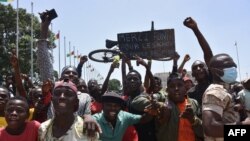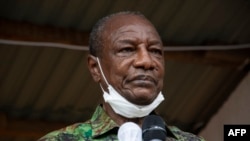Analysts say plans by Guinea’s transitional military government to prosecute former president Alpha Condé and 26 of his top officials will likely be marred by doubts over the fairness of their trials.
A 2019 Afrobarometer survey revealed that over 90% of Guineans consider the judiciary to be corrupt.
Additionally, Jesper Bjarnesen, a senior researcher at Denmark-based Nordic Africa Institute, told VOA that this trial is arguably a diversion.
''There are legitimate charges against the former president,” he said, but added ''I think that a transitional government has the primary task to work towards free and fair elections.''
As for judicial credibility, Bjarnesen said, “I am not sure that a temporary transitional government is the best facilitator of a legal process against the former president” and his cadre.
''There might be room for reconstitution of the judiciary with the military takeover, but that's still a very slim hope in a system where there's systematic abuse of power,” Bjarnesen said. “What's more likely,” he said, “is that you'll have new people in power making use of a dysfunctional system.”
Condé was ousted by the military last year and placed under house arrest, which the military regime lifted on April 22. But it’s clear he is not free to leave the country.
Charges filed against Conde and the others include acts of violence while in office, complicity in murder, and assault to destruction of property. Other charges include detention, torture, rapes, kidnapping, disappearances, other sexual abuse, and looting.
Alix Boucher, at the Washington-based Africa Center for Strategic Studies, told VOA she doubts the interest of the military junta in ''upholding justice',” noting that the junta’s suspension of the constitution since the September 2021 coup would make such trials “highly ironic.''
Guineans are “still waiting for those responsible for the massacre and mass rapes committed by the previous junta at the stadium in Conakry in September 2009 to be prosecuted,” she added. “The lack of confidence that such trials would be free and fair reflects Guinea’s weak legacy of independent oversight institutions, even under Condé.''
Boucher said that the junta’s timeline for prosecuting Condé and the 26 others suggests it is set on hanging onto power. The military recently said it needed 39 months to transition back to civilian rule, refuting demands by the Economic Community of West African States (ECOWAS) to do it much sooner.
“Such pronouncements [by the military regime] lack credibility and obscure the essential takeaway that the junta has no plans to relinquish power on its own,” Boucher said.
Guinea has a long legacy of military and authoritarian governments. But 77% of Guineans prefer democracy to any other regime and want two-term limits for the presidency, according to the Afrobarometer survey.
''Therefore, the junta’s aim to hold power is a direct effort to undermine Guinean’s deeply held aspirations for a democratic government,” Boucher said.






